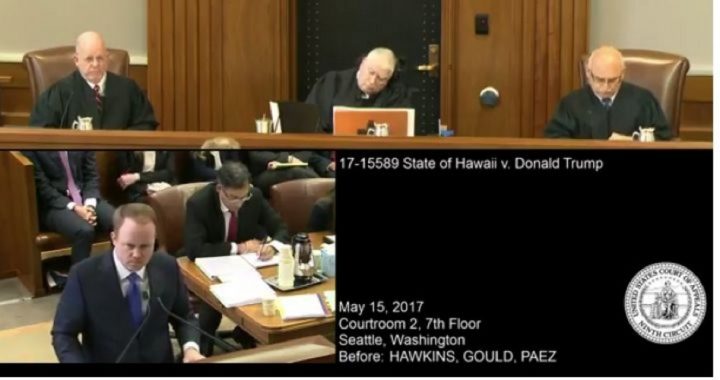
On May 15, the 9th Circuit Court of Appeals in Seattle heard arguments (shown) from attorneys for the Trump administration and the state of Hawaii, after the administration asked the appeals court to reverse U.S. District Court Judge Derrick K. Watson’s March 16 order that blocked President Trump’s March 6 executive order entitled “Protecting the Nation From Foreign Terrorists’ Entry Into the United States.”
That March 6 order was Trump’s second attempt to ban foreign nationals from six countries identified as being state sponsors of terrorism or havens for terrorists, the first having been issued on January 27. After another judge in Seattle issued a ruling stopping that executive order, Trump replaced it with a revised one. The second order dropped some language that had been included in his original January 27 travel ban order that made exceptions for religious minorities. This should have removed any justification for calling the order a ban on Muslims, but judges Watson and U.S. District Judge Theodore Chuang in Maryland were still not satisfied with the revised language. Both judges (who were appointed by former president Obama) made numerous references to Trump’s alleged anti-Muslim bias in their respective decisions.
The revised travel ban that Trump signed on March 6 would block for 90 days the entry of foreign nationals from six majority-Muslim countries that have had high levels of terrorist activity. It also would suspend the admission of refugees from these nations for 120 days. There are exceptions for permanent U.S. residents and current visa holders.
Following Chuang’s and Watson’s rulings on March 16, the Trump administration brought an appeal of Chuang’s decision to the 4th U.S. Circuit Court of Appeals (which covers appeals from district courts in Maryland, Virginia, West Virginia, and the Carolinas). On March 24, Judge Anthony Trenga of that court upheld President Trump’s revised March 6 executive order. However, Trenga’s ruling was not the final word on the appeal, and a 13-judge panel from the 4th U.S. Circuit Court of Appeals heard the Justice Department’s challenge to Chuang’s decision on May 8. The court has given no indication about when it might rule.
Acting Solicitor General Jeffrey B. Wall asked the 9th Circuit Court of Appeals to reverse Watson’s order, and the May 15 session was conducted to hear arguments related to that appeal.
Though the court’s three-judge panel (all of whom are appointees of former President Bill Clinton) had made no decision as we write, the line of questioning pursued by the judges reveals a certain preoccupation with statements that Trump made during his presidential campaign last year — which might cause them to interpret the executive order as a ban on Muslims rather than a security measure to keep terrorists out of the country.
For example, Judge Ronald M. Gould asked Wall, “The executive order sets out national security justifications, but how is a court to know if, in fact, it’s a Muslim ban in the guise of national security justification? That’s the nub of the case.”
Wall responded, arguing that “the order on its face has nothing to do with religion and the operation doesn’t distinguish on the basis of religion.”
Wall argued that only post-election “official capacity statements” should be considered in evaluating the executive order. Judge Michael Daly Hawkins asked whether Trump has ever disavowed his campaign statements about Muslims. “Has he ever stood up and said, ‘I said before I wanted to ban all members of the Islamic faith from entering the United States of America. I was wrong’?”
Wall replied that Trump had indeed disavowed his earlier campaign statements. “Over time, the president clarified that what he was talking about were Islamic terrorist groups and the countries that shelter or sponsor them,” said Wall, adding that “what he wanted to do was increase the vetting procedures.”
Neal Katyal, the attorney for the state of Hawaii, challenged Wall’s answer, arguing that “when he issued both executive orders, he left on his [campaign] website that very statement about the complete and total shutdown of Muslims, a statement that happened to disappear moments before the 4th Circuit argument last week.”
However, another judge, Michael Daly Hawkins, reminded Katyal of a filing he wrote in favor of former President Obama’s immigration plan, in which Katyal argued that the president has power to “balance a broad range” of foreign policy and other considerations.
“I know [the plaintiffs] disagree with this president and many of his policy judgments but none of that converts this into a constitutional crisis,” Wall stated in defense of the executive order. “And we respectfully submit that this court shouldn’t treat it like one. It ought to leave this debate where it belong[s], in the political arena.”
CNN reported on May 15 that in the event the 4th and 9th appellate courts arrive at different results, the Trump travel ban will not go back into effect as long as one court’s nationwide injunction remains in effect. CNN cited the opinion of legal experts who say such a scenario would undoubtedly result in the case being reviewed by the Supreme Court.
“There’s no guarantee that the 13 4th Circuit judges who heard argument last week will hand down their ruling before the three 9th Circuit judges hearing [the May 15] argument will,” said Steve Vladeck, CNN legal analyst and professor of law at the University of Texas School of Law. “The real question, though, isn’t the timing, but whether the two courts come out the same way. This issue may be bound for the Supreme Court no matter what, but it will certainly be heard by the justices if these lower courts disagree.”
“No matter how the two courts rule, I predict this case will go to the Supreme Court,” CNN quoted Cornell Law School professor Stephen Yale-Loehr. “The issue is too important for the Supreme Court to pass up.”
Image of court proceedings: 9th Circuit Court
Related articles:
Federal Judge Upholds Trump Travel Ban Blocked by Other Courts
Federal Judges Again Block Trump Travel Ban From Nations With Terrorist Ties
Trump Signs New Immigration Executive Order
Judge Grants Stay to Bar Trump DHS From Deporting Aliens From Seven Nations of Concern
Trump’s Order Suspending Refugee Program: Racism or Balanced National Security?
Trump Executive Order to Ban Nationals of “Countries of Particular Concern”



